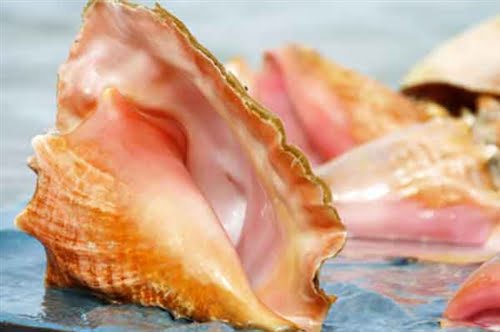Pintard: The goal is to eliminate the export of conch
NASSAU, BAHAMAS — As the government moves to gradually reduce conch exports over the next three years before ultimately banning the export of the fisheries product, data released yesterday showed that nearly 640,000 pounds of conch meat were exported from The Bahamas in 2018.
The exported conch meat last year was valued at $4.48 million.
The royalties from the export amounted to $63,984, the data shows.
The figure is based on the regulated duty rate per pound and does not include other taxes such as stamp tax or value-added tax (VAT).
The data, released by the Ministry of Agriculture and Marine Resources, also showed that nearly 138,000 pounds of conch shells, valued at $29,810, were exported last year.
The royalties associated with the export of conch shells last year were $4,135.05.
The government has announced plans to marginally decrease the quota of conch exports this year and dramatically reduce exports in 2020 and 2021 in line with the advice of international conservations.
There was widespread public debate about conch sustainability and its protection earlier this year following a study that revealed a significant depletion of the queen conch population.
During a press conference yesterday to discuss the opening of crawfish season and compliance with the law, Minister of Agriculture and Marine Resources Michel Pintard said the government will make an informed decision about the industry, including a potential closed conch season.
“We are reducing the quota of exports and the goal is to eliminate the export of conch from our standpoint unless someone has the science to dissuade the government from that position,” he said.
Pintard acknowledged criticisms of the government not moving swiftly enough.
In response, the minister said those who hold that view should appreciate that stakeholders in any industry would be extremely concerned about a government making a decision without any consideration, consultation, “warning or preparation”.
As it relates to a closed season, Pintard said: “Conch season has not been on the table in terms of what this department has put forth to the public.
“We are aware that there is a petition circulating by members of civil society and conch season has been one of the options raised by persons who are concerned about the conch stock.
“We have been very clear in the ministry in terms of the measures we are pushing and I can outline those, but I should also say that a survey is being conducted nationally to get the views of all stakeholders.
“We will make decisions at the end of having canvassed all stakeholders.”
He also said the government wants fishermen to give “serious consideration to the possibility that we will ask them to land conch in the shell, since lip thickness is the best way to determine the maturity of the conch”.
A survey from Bahamian market and opinion research firm Public Domain revealed that the majority of participants oppose a ban on the export of conch.
In total, 53.5 percent of the respondents either somewhat opposed (18.7 percent) or strongly opposed (34.7 percent) a ban on the export of conch from The Bahamas.
However, more than 85 percent of respondents support the idea of a closed season for conch.
Public Domain conducted telephone interviews between May 26 and June 23, 2015.
Chicago’s Shedd Aquarium, along with the group Community Conch, measured more than 3,000 conch at 42 survey sites throughout The Bahamas over an eight-year period (2009-2017).
The survey, published in the scientific journal “Reviews in Fisheries and Science and Aquaculture”, determined that the density of mature conch was far below the established minimum threshold for reproductive success, except in remote areas.
It was commissioned by Community Conch, with the lead authors being Community Conch scientists and data between 2016 and 2017 being provided by Dr Andy Kough of Chicago’s Shedd Aquarium.
The scientists recommended The Bahamas establish a size limit for legal harvesting based on a 15-millimeter shell lip thickness, end the export of queen conch from The Bahamas and enforce the landing and trade of conch in the shell to improve enforcement.
External factors including poachers have contributed to the depletion of a variety of fisheries products.






